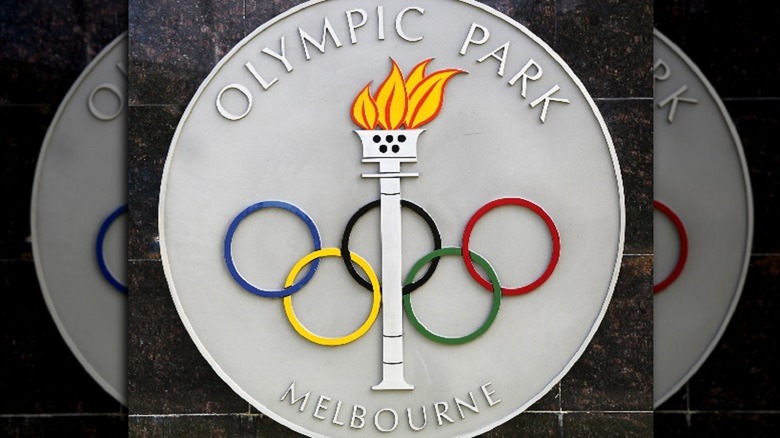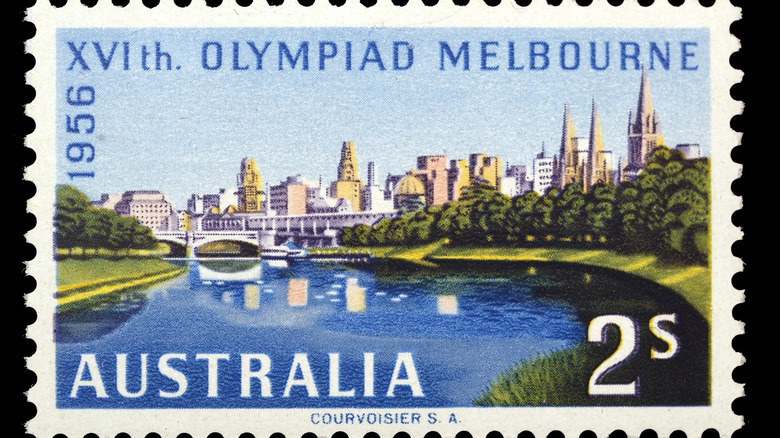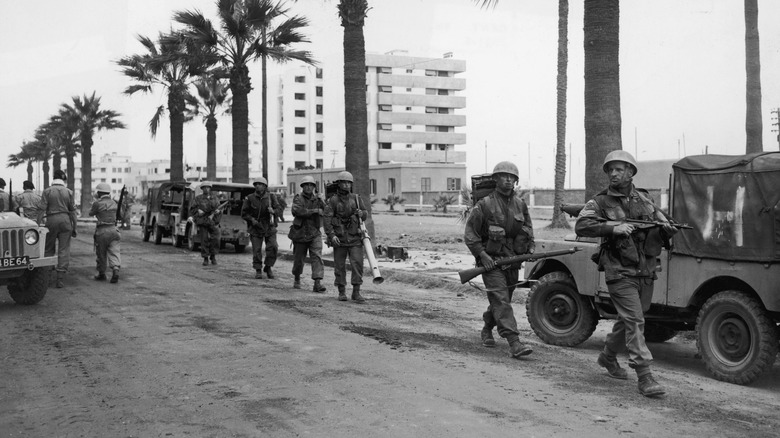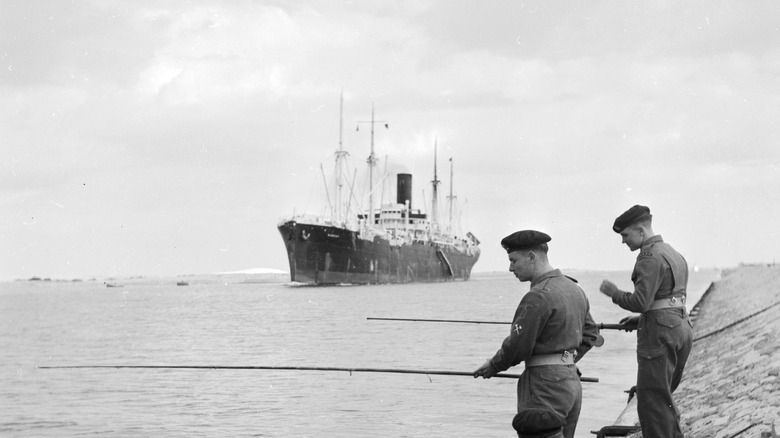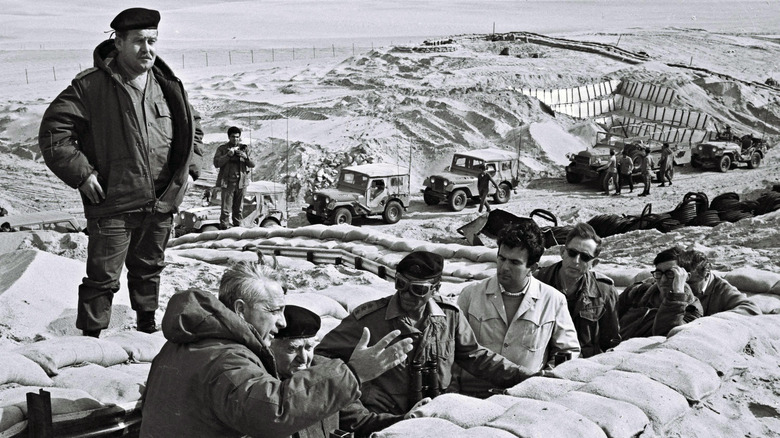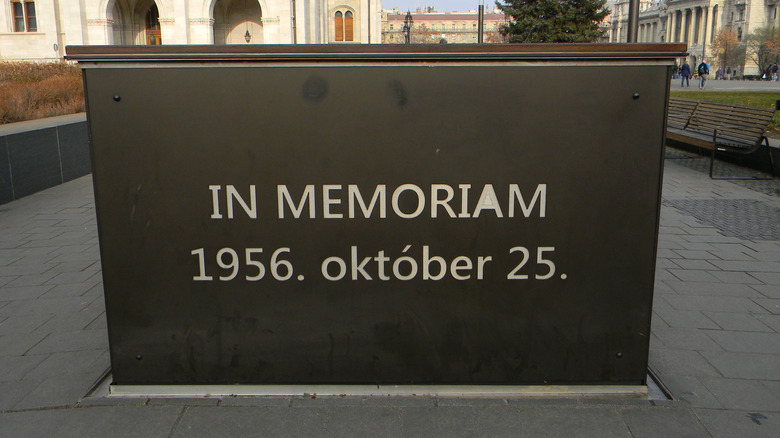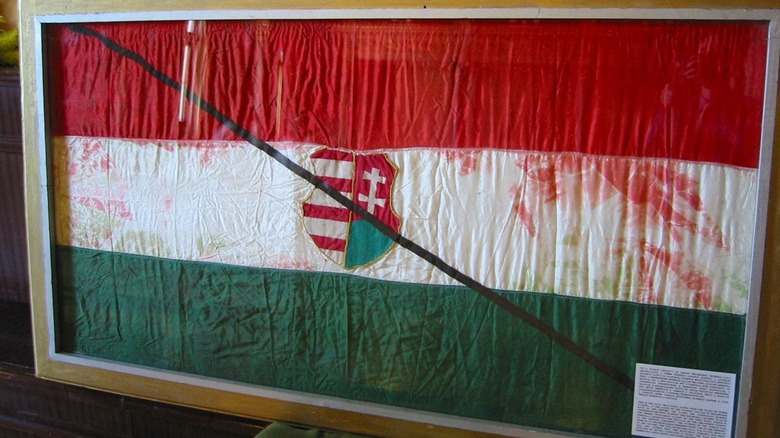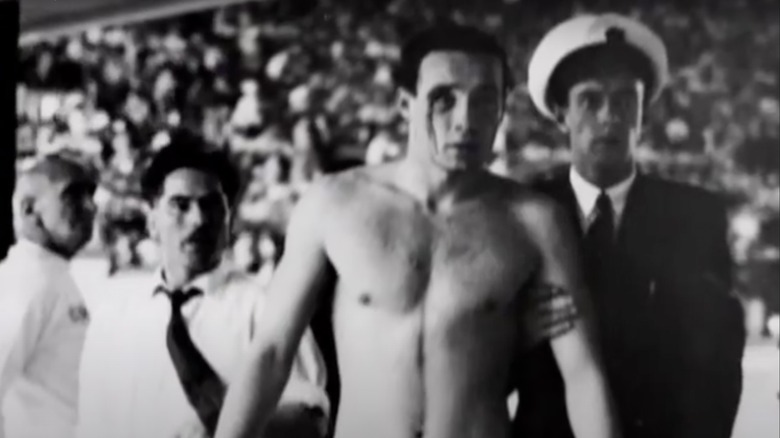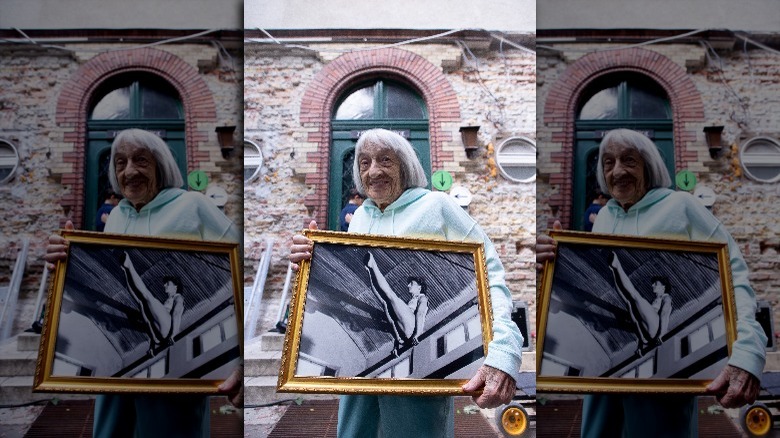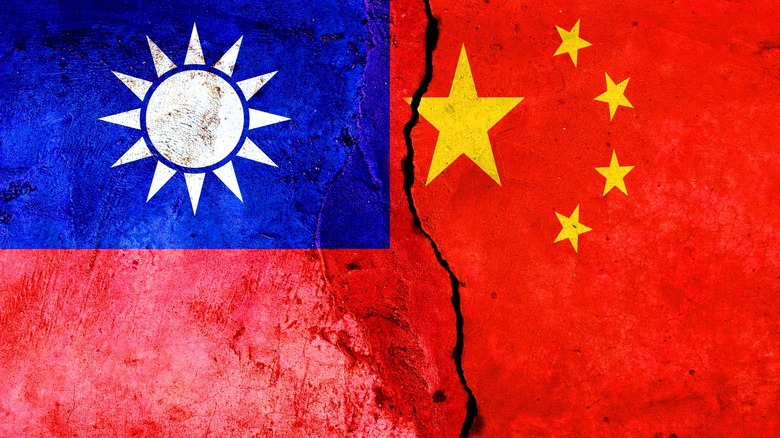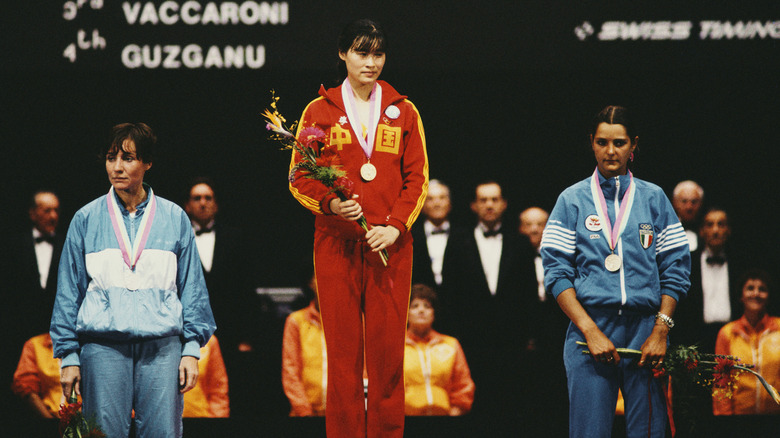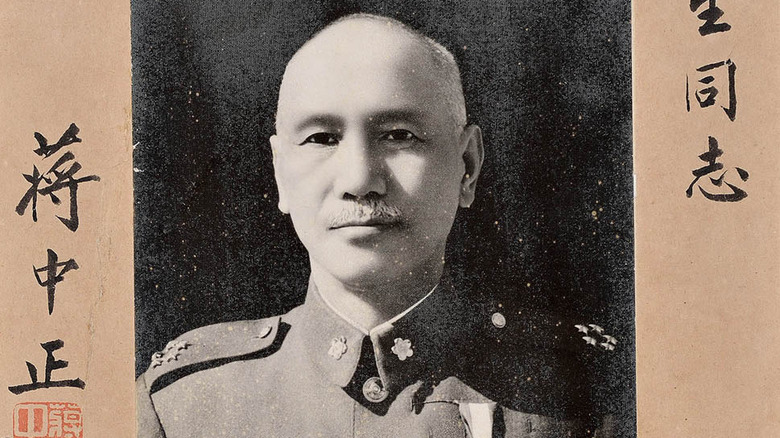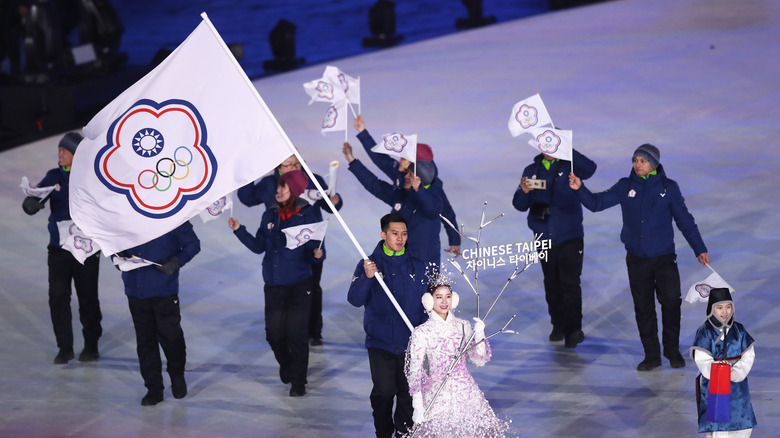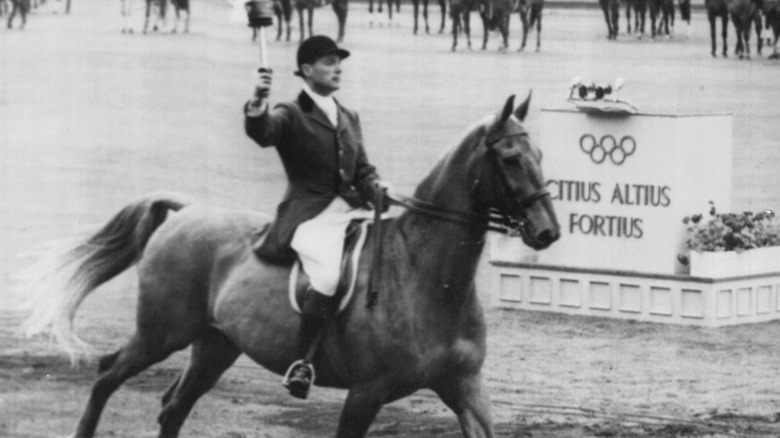Inside The Boycotts Of The 1956 Summer Olympics
The 1956 Summer Olympic games was one of the most controversial in history. Although the modern Olympics had been running since 1896, the summer of '56 saw the first ever nations to boycott the event — eight of them total (via The Advocate). The games came at an incredibly tense time in world history. With WWII having ended only a decade prior, the Cold War was in full swing. Nations around the globe were revolutionizing, seeking independence, and separating in two. With all this chaos, you would think sports would be the last thing on anyone's mind. And yet, members of established and fledgling nations alike sought victory, for themselves and their countries, on the Olympic stage.
Near the close of a games marred by controversy, the International Olympic Committee (IOC) received an anonymous letter. It suggested a new tradition for the closing ceremony, in which the teams would forgo their individual nation's flags and all march under one banner. In a show of unity that still holds today, all the competitors mixed together, walking in one huge crowd of athletes.
The 1956 Summer Olympics was a highly disputed games
The leadup to the 1956 Games was incredibly tumultuous — both in terms of global history and Olympic politics. For starters, even setting the location of the games was a giant ordeal. As all previous games had been held in Europe or North America, the Summer 1956 Olympiad was the first games held outside of the Northern Hemisphere. This meant that "summer" became a relative concept, as setting the games during the hottest part of the year in the host country would place the festivities in the winter (November and December) for many of the athletes. Officials argued back and forth about whether or not this made sense, especially for Northern athletes, who were used to having those months as an off season.
Because of the date-setting controversy, many pushed to have the games moved to Rome (who was to host the following games and had already begun constructing facilities). Adding fuel to the relocation fire, the Australian government repeatedly refused to allocate housing funds for an Olympic village. Both the premier and the prime minister were adamant about their decision, leaving thousands of athletes to wonder if they would be able to find lodging.
Lastly, the three boycotts led by eight nations caused the number of competing athletes to drop from almost 5,000 to less than 3,500. According to China Daily, because of the inter-country disputes, some countries even mandated their athletes not mingle in the Olympic village.
Iraq, Egypt, Lebanon, and the Suez Crisis
Egypt, Iraq, and Lebanon became the first group to boycott the 1956 Olympics following the explosion of the Suez Crisis. Although it had been building for many years, the crisis came to a head on October 29th, when Israel, France, and the United Kingdom invaded Egypt to try and take control of the Suez Canal — roughly one month before the start of the Games.
The Suez Canal was built in 1869 by a French diplomat. It was jointly owned by the Egyptian government and a concessionary company, which was controlled by the French and British. Although Egypt became officially independent in 1922, British occupation of the state (mainly to maintain trade interests at the canal) continued through the early 20th century, and eventually was legally delineated with the Anglo-Egyptian treaty in 1936. This treaty stipulated British forces would remain in Egypt for 99 years to protect (their interests in) the Suez Canal, which allowed quick, cheap trade between Britain and its colonies in India.
However, this treaty was abrogated by the new Egyptian government following the 1952 coup d'état. The UK agreed to leave Egypt soon after, but by the spring of 1956, they had not. Their refusal to leave prompted the Egyptian government to nationalize the Suez Canal, which would effectively remove any British claim to the land and push them out of the country. According to History, the Egyptians also announced they would claim tariffs from ships passing through the canal.
A symbol of Middle Eastern conflict
Although the intention of nationalizing the Suez Canal was to regain Egyptian sovereignty and kick out their colonial occupiers, its main effect was enraging the United Kingdom, who then sought to "bring about the downfall of the present Egyptian government."
To help them achieve their lofty goal, the British government called upon the French — who themselves had a history of occupation in Egypt, in addition to being the ones who built the canal — and the Israelis — whose state was created out of British colonial land — to help them invade Egypt. There was also an element of Cold War politics at play, with the new Egyptian government following anti-imperialist and non-alignment principles, and Israel's sympathy clearly lying with the Western-Capitalist cause.
According to historian Sam Thomas Schelfhout, Egypt, Iraq, and Lebanon viewed the invasion as an attempt by the European powers, along with their Middle Eastern puppet, to seize undue power in the region. If the invading forces were to take back the canal, they would be controlling resources which could be used to bolster local economies, seizing land that was not their own, and asserting colonial power in a region which was intent on eliminating it (this era saw many other revolutions in the African and Arab worlds). As a response to the aggression, these countries chose to boycott the upcoming Olympics, and Cambodia joined them.
Israel was almost banned
While Egypt, Iraq, Cambodia, and Lebanon boycotted, the Israeli team was almost barred from competition due to its country's aggressive role in the conflict. The day after the invasion of Egypt, the head of the organizing committee for the Melbourne Games issued a public statement. He proclaimed that since warring nations were not allowed to compete, if Israel and Egypt were considered at war, Israel was not welcome at the Games.
The statement created backlash, especially with the IOC (who was a wholly separate governing body to the organizing committee). According to historian Sam Thomas Schelfhout, the IOC chancellor Otto Mayer then issued his own communication, calling the statement "ridiculous" and asserting that "this does not concern us." After some internal bickering, the original statement was eventually retracted. Although Israel did end up competing, they only sent three of their original 20 athletes in response to the boycotts against them.
This conflict between different governing members of the Olympic institutions brought to light an issue that would be repeatedly rehashed at a games filled with political boycotts. A key founding principle of the Olympics was that "sports geography" was to be "distinct from the political geography." This essentially meant that countries were to leave their quarrels on the battlefield or in the halls of parliament, putting their differences aside to compete in a non-political endeavor. However, it became more and more difficult for IOC members, who ultimately decide who can play and who is barred, to decide what — if any — political moves were too atrocious to ignore.
The Netherlands, Spain, and Switzerland protested the Soviet Union
The second boycotting contingent was made up of The Netherlands, Spain, and Switzerland, who boycotted on behalf of Hungary after a brutal Soviet invasion. At the end of WWII, the Soviet Union maintained forces in Hungary even after the Germans had been expelled. Despite holding an election, Hungary slowly became governed by Soviet-installed politicians, as the remaining troops and political advisors asserted power over the Hungarian government. Soviet military presence in Hungary was formalized in the 1945 Four-Power Allied Control Commission, which was to "oversee postwar political developments," and the new Hungarian Constitution of 1949, which was modeled after the Soviet constitution. The era was marked by harsh policies, including forced labor camps and deportations which affected nearly 600,000 Hungarians and killed an estimated 200,000.
After years of repressive policies, the Hungarians had enough, and a spontaneous, nationwide rebellion broke out. Hailed by Britannica as "one of the signal events of Cold War History," the Soviet repression of this Hungarian uprising against the regime proved to be incredibly violent. During the quelling, over 2,500 Hungarians died, and nearly 200,000 fled the country.
As the violent repression happened less than three weeks before the start of the Olympic Games, the Netherlands, Spain, and Switzerland chose to boycott in a show of support for Hungary. The three countries publicly announced the reasons for their boycott, saying the Soviet Union should not be allowed to participate in light of their aggression, and that the Hungarian team would be unfairly underrepresented due to the political situation.
Hungary's strong presence, tragic losses
Although several teams boycotted on behalf of Hungary, the Hungarian contingent still participated in the games, and was a strong presence at that. According to CBC, their appearance was met by large cheers from Australian spectators, who conversely booed the Soviets. The Australians purposefully ignored the Americans, neither cheering nor booing, as the American government had refused to intervene in the crisis.
The Hungarian team flew their national flag throughout the competition (pictured). This was meant as a flagrant show of disrespect to the Soviet Union, who had forbidden them from doing so. Despite being made to perform during a traumatic situation, the Hungarian team had a surprisingly good showing: they finished fourth overall with 26 medals (nine golds, 10 silvers, and seven bronze). However, two of Hungary's top athletes could not compete because of the political turmoil. One, a swimmer, was stuck in a Soviet prison. Another, a decathlete, had been killed during the Soviet invasion.
Blood in the Water
The Hungarian-Soviet tension came to a head with the men's water polo semifinals, where the two teams fought it out for a chance at the gold. The game was incredibly intense, with no shortage of contact and fouls from both sides. But the Hungarians fought hard against their political rivals, and were leading 4-0 by the end of the match (via Britannica).
Just a few minutes before time ran out, a Soviet player named Valentin Prokopov headbutted Hungarian Ervin Zador, opening a sizeable wound on his head. In an interview, Zador said he had been keeping an eye on (and smack talking) Prokopov the whole game, but when he looked away to see why the ref had blown his whistle, he was struck. "The next thing I saw," said Zador, "he had his full upper body out of the water and he was swinging at my head with an open arm."
Zador left the pool with blood streaming down his face, even trailing down the front of his torso and leg. At the sight of the Hungarian's blood, fans rushed the pool, attempting to physically fight the Soviet team. Riot police stepped in before much chaos could ensue, even escorting the Soviets from the pool. The Soviet team withdrew from the game, although they demanded a rematch. Because of the Hungarian's substantial lead (and, no doubt, sympathy towards their political situation) the referees gave the game to the Hungarians. The conflict went down in history as the "Blood in the Water" match.
Keleti vs. Latynina
In a lesser known battle between the Soviet and Hungarian teams, two female gymnasts from the sparring nations also went head to head. The competing athletes were Larissa Latynina, 21, from the Soviet Union, and Hungary's Agnes Keleti (pictured), who was a spectacle at 35 years old (according to Bustle, most female gymnasts retire in their early 20s). The two battled through four out of five individual events, including the ever-important all-around competition.
Keleti and Latynina were nail-bitingly close in most events, even tying for the gold in the floor exercise. However, a shockingly terrible 23rd place performance by Keleti at the last minute caused Soviet Latynina to win gold in the all-around competition. Despite the disappointment in her all-around loss, Keleti was still the most successful athlete at the 1956 Olympics, with six total medals.
After the competition, Keleti was one of 44 Hungarian athletes who stayed in Australia, receiving political asylum due to the situation back home. She later immigrated to Israel, where she coached their Olympic gymnastics team. Keleti has led an incredible life, having survived the Holocaust, the Soviet repression, and even making it to her 100th birthday in 2021.
The People's Republic of China boycotted over Taiwan
The last country to boycott the Olympics in 1956 did so by themselves. In this final conflict, the People's Republic of China (PRC) refused to participate in the games because the Republic of China (ROC), also known as Taiwan, was permitted entry. The heart of this issue lies in the "Two Chinas" problem, which remains a source of conflict in politics today.
According to Britannica, after the Chinese Communist Revolution in 1949, China split into two groups. The mainland communists, who won the revolution, now called themselves the People's Republic of China. They had control over nearly all of mainland China and measured roughly 600 million in number. The losers, a minority of more than two million nationalists, fled to the nearby island of Taiwan and claimed the title Republic of China. Despite remaining ill will between the parties, the two fledgling nations soon signed a diplomatic truce. A central component of this truce was the institution of the One China principle, which stipulated that the two now-separate states would operate under one cultural and political banner to the outside world. The truce was meant to settle the question of which government was the "true," legitimate Chinese government, which of course both the PRC and the ROC claimed to be.
While the truce operated well for a short time, the Olympics brought to light the still unresolved issue of defining the one "true" Chinese government.
The Olympics brings 'Two Chinas' into view
The key to understanding the Olympic conundrum is this: If both the PRC and ROC sent separate teams, they would be expressing "Two Chinas," and would thus be in violation of the diplomatic truce; however, if only one team went, they would effectively be named by the world as the one "true" China, which both violated the truce and had major diplomatic implications. The only way to settle the dispute without breaking the treaty was to have both teams under one banner, which neither wanted to do. Plus, would they fly the PRC flag, the ROC flag, or something else entirely?
With each country desperate to be named the one true China on the world stage, the two parties went about bad-mouthing each other and sabotaging the other's attempts to enter the games (according to UT Austin, this meant the ROC hunting through the IOC bylaws for broken rules, and the PRC attempting to poach athletes from the Nationalist territories). Further complicating the issue, most of the athletic organizations — including the Chinese branch of the Olympic Committee and its archives — had fled the mainland. Because the Olympic rules state that a country needs an approved National Olympic Committee to be eligible for entry, Taiwan was now the only China with an official bid to the Olympics. While Taiwan was legally the only China up for a bid, if the Olympic committee were to choose the ROC to compete over the PRC, they could be setting off a diplomatic domino effect that could change the course of world history.
China vs. Taiwan
Needless to say, the "Two Chinas" issue was incredibly complicated, and had implications far beyond the Olympic Games. This caused Olympic authorities to be somewhat reluctant in trying to find a compromise. But soon enough, the games rolled around, and they were forced to make a decision. The issue actually came to a head at the 1952 Olympics, which was the first Olympics after China's separation. Here, after much discussion on the part of the IOC, both parties were invited to participate. Taiwan refused the invitation, citing the "One China" principle, which was a bid to force the IOC into recognizing them over the PRC. However, their plan backfired when the PRC participated solo.
For the 1956 games, the PRC was voted into the IOC by a two-vote margin, giving them a "legal" right to enter. This caused Taiwan to briefly withdraw their IOC membership in protest, although they rescinded their withdrawal at the last minute.
Finally, on the day of the opening ceremony, a PRC representative snuck into the flag area. There he managed to convince the Australian staff to switch the Taiwanese flag for the mainland flag, telling them they had the wrong one. Luckily, Taiwanese officials noticed right before the flags were hoisted and changed it back. Seeing the Taiwanese flag go up despite their efforts, the PRC officials then penned a strongly worded letter about how the flag was an insult to them, and finally withdrew in protest from the entire games. According to the South China Morning Post, China (PRC) would not compete again in a Games until 1980.
A tough road ahead for Taiwan
Despite prevailing over the PRC in the 1956 games, the ROC has faced difficulty in gaining proper Olympic representation in the years since. Taiwan lost official representation before the 1976 games and boycotted because of it. According to the New York Times, the Canadian government said Taiwanese athletes would not be allowed into the country unless they agreed to compete under the banner of mainland China.
Tensions continued to boil until 1979, when the Nagoya Resolution allowed them to compete again, but only under the purposefully ambiguous name Chinese Taipei. On top of not getting proper name recognition, the resolution named them as a branch of mainland China's team and a province of China, rather than a separate state. Although they initially agreed to the terms, they protested the decision by boycotting the 1980 Summer Olympics. However, they reluctantly returned to compete under this name at the 1984 Winter Olympics. Most recently, they again risked an Olympic ban for the 2020 Tokyo games due to a preemptive name change request in 2018. Asking yet again to be called Taiwan instead of Chinese Taipei, they were told they would not be allowed to participate if they made any changes to their team's name. Taiwan backed down and was able to compete in the games under the name Chinese Taipei.
Other controversies
As if that wasn't enough drama for one Games, a few other (relatively) minor controversies came up. Firstly, the equestrian portion of the games was held halfway across the world in Stockholm, Sweden due to strict animal quarantine restrictions in Australia. Second, the Eastern Bloc submitted a host of "full-time amateur athletes," which many argued were not amateur enough to be qualified for the Olympic games. According to WSUM, this title allowed for athletes to be identified as amateurs — with professions listed as "students" or "mechanics" — but in actuality be paid by the state to maintain their training. Additionally, East and West Germany united as one team, despite political tensions (which would ultimately win out in the 1960s resulting in the separation of the teams).
Because of the controversies, the tradition of all athletes uniting under one flag for the closing ceremonies was created. Near the close of a games marred by controversy, the International Olympic Committee (IOC) received an anonymous letter (years later, the writer identified himself as Australian teenager John Ian Wing). It suggested a new tradition for the closing ceremony, in which the teams would forgo their individual nation's flags and all march under one banner. Such a show of unity felt incredibly needed at the time, and the IOC chose to implement the anonymous suggestion. In a tradition that still holds today, all the competitors mix together under one banner and march out the close of the games, walking in a crowd of athletes rather than as distinct nations.
